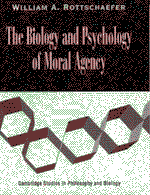Book contents
- Frontmatter
- Contents
- Preface
- Introduction
- PART I MORAL AGENCY AND SCIENTIFIC NATURALISM
- 1 Understanding moral agency: What is a scientific naturalistic view of moral agency?
- PART II THE BIOLOGICAL BASES OF MORAL AGENCY
- PART III THE PSYCHOLOGICAL BASES OF MORAL AGENCY
- PART IV A SCIENTIFIC NATURALISTIC ACCOUNT OF MORAL AGENCY
- PART V INTEGRATING A PERSONALISTIC AND NATURALISTIC VIEW OF MORAL AGENCY
- References
- Index
1 - Understanding moral agency: What is a scientific naturalistic view of moral agency?
Published online by Cambridge University Press: 19 September 2009
- Frontmatter
- Contents
- Preface
- Introduction
- PART I MORAL AGENCY AND SCIENTIFIC NATURALISM
- 1 Understanding moral agency: What is a scientific naturalistic view of moral agency?
- PART II THE BIOLOGICAL BASES OF MORAL AGENCY
- PART III THE PSYCHOLOGICAL BASES OF MORAL AGENCY
- PART IV A SCIENTIFIC NATURALISTIC ACCOUNT OF MORAL AGENCY
- PART V INTEGRATING A PERSONALISTIC AND NATURALISTIC VIEW OF MORAL AGENCY
- References
- Index
Summary
MORAL AGENCY
We begin by considering an ordinary perspective on being a moral agent. By an ordinary perspective I mean one that is shaped by our ordinary experience of and reflection on being a moral agent. You can probably recall many small and some very large moral decisions in your life. Some of these are more personal — regarding, for instance, telling the truth in a situation where the truth was rightfully demanded, but it was in your interest to be silent or to shade your story. Some decisions may have been more communal — whether, for instance, your professional group or union should actively oppose or support the right of a woman to have an abortion. Many decisions, no doubt, concerned issues in which science and technology played some part in both the problem and possible solutions. Should I carpool? Should I support a movement in Congress to eliminate funding for environmental protection? What does the ordinary perspective on moral agency say about moral agency given experiences of the preceding sort and reflection on them? It probably says a lot of different things since, on one level, there are as many experiences and reflections as experiencers and persons reflecting on their experiences. However, let's generalize and see if we can say some broad things about moral agency.
- Type
- Chapter
- Information
- The Biology and Psychology of Moral Agency , pp. 9 - 26Publisher: Cambridge University PressPrint publication year: 1997

